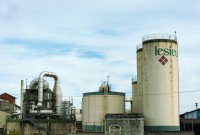- Home
- Business Processes
- Industry Knowledge
- Aerospace Industry
- Automotive Industry
- Banking Domain
- BFSI Industry
- Consumer/ FMCG Industry
- Chemicals Industry
- Engineering & Construction
- Energy Industry
- Education Domain
- Finance Domain
- Hospitality Domain
- Healthcare Industry
- Insurance Domain
- Retail Industry
- Travel and Tourism Domain
- Telecom Industry
- Leadership Skills
- eLearning
- Home
- Domain Knowledge
- Chemicals Industry
- Chemicals Industry’s Supply Chain
Chemicals Industry’s Supply Chain
This article explains the chemical industry supply chain and addresses key questions like the importance of supply chain management and why the chemicals industry needs to focus on supply chain management. Understand the key factors influencing the supply chain for the chemicals industry and strategies to overcome the current challenges.
What is a Supply Chain?
According to the US Council of Logistics Management, the definition of the supply chain is “Supply Chain Management encompasses the planning and management of all activities involved in sourcing and procurement, conversion, and all Logistics Management activities. Importantly, it also includes coordination and collaboration with channel partners, which can be suppliers, intermediaries, third-party service providers, and customers. In essence, Supply Chain Management integrates supply and demand management within and across companies.”
What is the importance of Supply Chain Management for the Chemicals Industry?
Made up of several smaller industries including bulk, specialty, and polymers, the chemicals sector covers hundreds of segments, and hence a large variety of raw materials are needed to produce industrial chemicals that supply other industries and customers. Supply chain and logistics are vital to chemicals companies’ success because they represent a high share of cost and are critical for service level and top-line results. Supply chain costs represent an average of 8-10% of sales revenue for chemical companies and this reflects the relatively low value per ton of chemical products and relatively high costs of moving and storing them, given their bulky and hazardous nature.
Why do Chemical Industries need to focus on Supply Chain?
The Chemicals industry is also unique in supplying virtually every other sector of the economy with essential materials. The competitiveness of all these other sectors is partly dependent on the efficient supply of chemical products. It is for this reason that the chemical industry has been described as the ‘anchor’ of a modern economy. Faced with challenges such as global competition and global customers, increasingly complex operations, and rising logistics costs, a growing number of chemical companies are focusing on the supply chain to balance costs & service levels and drive flexibility and sustainability.
Importance of Logistics in Chemicals Supply Chain:
Logistics are a key aspect of the chemical industry as production and consumption locations are mostly separated. Efficient, competitive, and sustainable logistics are therefore of great importance for its future development. For example, it is common for explosive, toxic, and dangerous materials to be transported through the supply chain. Great care must be taken to ensure safety and security during transportation. Chemical transportation must be carefully planned and controlled at every stage, from the production facility to the end-user. Companies need to consider the type of containers used for transporting the chemicals and whether they will travel by truck, train, or boat; the organizations that will have access to the materials during shipment; and how they can get real-time information about the location and status of the materials, in order to minimize risk. Logistics management for the chemicals industry demands continuous improvement in operational safety and security. Supply chain security and risk management will be a key area within logistics to prevent disruptions due to factors such as major transport accidents, theft, labor issues, and terrorist threats.
Continuous improvement of safety and security standards will remain a high priority for chemical companies. This will require close co-operation with logistics service providers and joint improvement programs. Stringent selection and continuous monitoring of the performance of logistics service providers will remain necessary.
Impact of Regulations on Supply Chain:
Chemical companies are required to adhere to strict regulations, as well as limit the possibility of spoilage, accidents, or spills occurring. Security measures must be taken to ensure that dangerous chemicals do not fall into the wrong hands. There is an ever-increasing emphasis on emission reduction, safety and security from both the general public and politicians resulting in increased regulation, focused on emission reduction and improvements in safety and security standards. Competitive pressure to lower costs and environmental pressure to manage resources more sustainably increases the importance of the supply chain. Finding the optimum balance between cost, responsiveness, and sustainability is the key to advance logistics solutions.
Impacts of Globalization on Chemicals Industry Logistics:
Globalization has resulted in increased supply chain complexity for the chemicals sector. There has been a significant increase in imports from the Middle East Countries and resulted in increased supply chain complexity for chemical producers in the areas of logistics management, planning, and coordination. This is exacerbated by a focus on working capital reduction, leading to lower inventory levels and ultimately demanding further supply chain flexibility. The production shift has led to a change in the global trade balance and has an impact on lengthening the supply chain from suppliers via producers to customers. This results in a change in logistic flows and longer lead times for inbound materials.
Supply Chain Assets:
Chemical companies manage supply chain assets used for transportation, including drums, cylinders, rail cars, bulk containers, and tanks. They need to ensure that they have a sufficient number of these assets on hand at each plant, distribution center, warehouse, and port to maintain day-to-day operations and ensure the fulfillment of delivery promises to customers. To achieve this many industry players own private fleets and distribution centers depending on manufacturing locations and distance from the demand for the end products. Chemical companies should consider the full business value chain and obtain a clear view of how the operational components of an organization are currently configured and function together to execute the business strategy. It should provide an end-to-end view across the significant elements of operational activity.
Use of Technology:
Logistics models have evolved over time to address the changing needs of the market and vary based on the scope of service offering and degree of collaboration across the supply chain. The move towards integration ran at a slower pace in the chemical industry compared to others e.g. automotive. Rapid advances in supply chain technology enable increased functionality across multiple sites and countries and a greater potential to improve the performance of supply chains (e.g. IT enabling real-time tracking & tracing and supply chain visibility, complex multi-echelon planning tools, cloud computing). The chemicals industry needs to start using integrated planning systems to improve logistics asset productivity and network reliability.
Related Links
You May Also Like
-
Importance / Impact of Chemicals Industry
Chemical Industry is engaged in the development, optimization, and monitoring of fundamental chemical processes used in industry for transforming raw materials and precursors into useful commercial products for society. Learn more about the importance and impact of the chemical industry on agriculture, environment, hygiene, food, painting, etc.
-
This article provides a concise history of the chemicals industry. How the chemical industry progressed and changed over time. Explore the journey of the Chemical industry from the early ages to the twenty-first century. Chemicals have been manufactured for thousands of years. The history of the chemicals industry can be traced back to ancient times when alkali and limestone were combined to make glass, and sulfur and saltpeter became an explosive that is similar to modern gunpowder.
-
Overview of Chemicals Industry
The chemical industry is critical for the economic development of any country, providing products, and enabling technical solutions in virtually all sectors of the economy. This article provides an overview of the chemical industry, explaining the definition and processes in the chemical domain. Read about the various segments of the chemical industry and what they do. A brief discussion on the major players in the chemical domain and their impact on the global and US economy.
-
Chemicals Industry’s Supply Chain
This article explains the chemical industry supply chain and addresses key questions like the importance of supply chain management and why the chemicals industry needs to focus on supply chain management. Understand the key factors influencing the supply chain for the chemicals industry and strategies to overcome the current challenges.
-
Fundamentally, the chemicals industry can be divided into two sectors; commodity/basic chemicals and specialty chemicals. Commodity chemicals are manufactured by many different companies however the end product is generally the same with very little variations. There exist other segmentations for this industry as well. Understand the main sectors of the chemical domain.
-
Business Model & Value Chain of Chemicals Industry
Understand the three critical business models applied by the Chemicals Industry to create value for its customers; asset-driven business model, integrated business model, and specialties business model. This article also explains the chemical industry value chain and provides some practical examples for a better understanding.
-
Industry trends are examined to make predictions. This article discusses the trends in the chemicals industry including trends related to consumer behavior, employment, technological advancements, new product development, competition, government norms, and other factors that impact the industry.
Explore Our Free Training Articles or
Sign Up to Start With Our eLearning Courses

About Us
Learning
© 2023 TechnoFunc, All Rights Reserved







